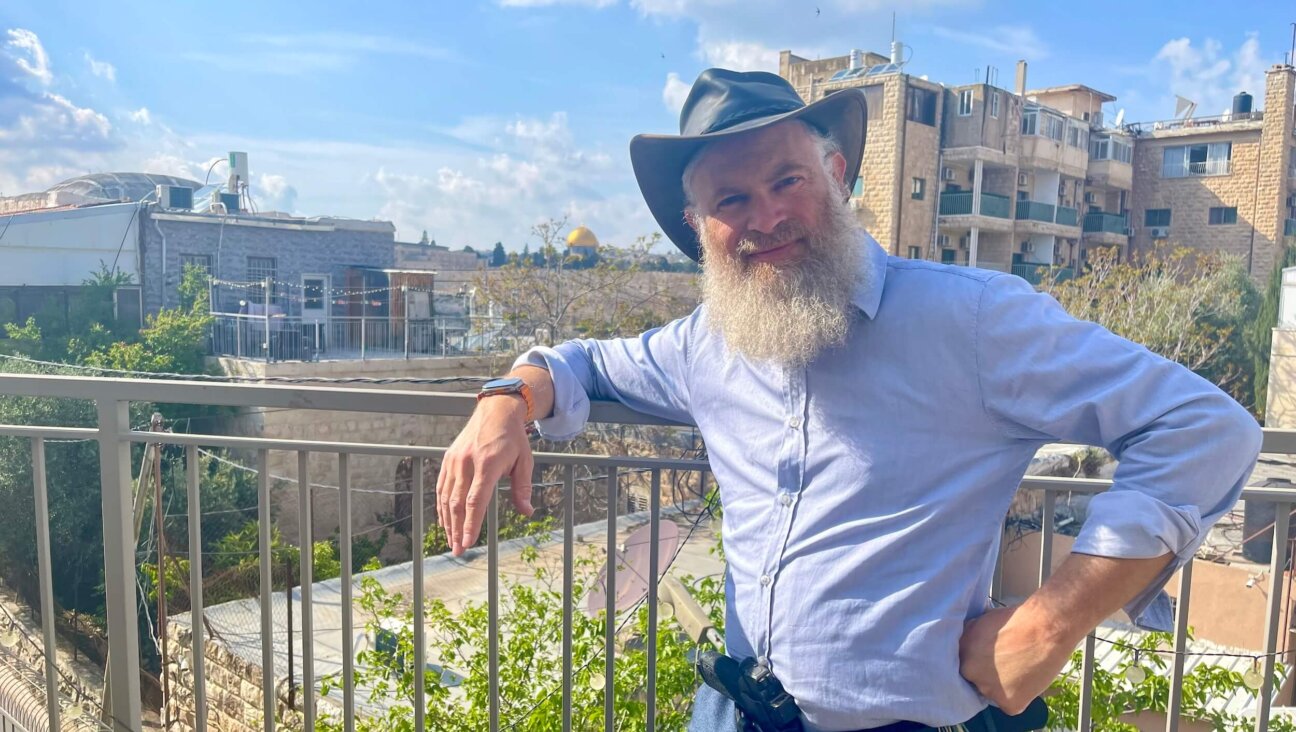Plucky Lawyer Fights for Abuse Case Files


Pushing Hard or Hardly Pushing? Is Brooklyn prosecutor Charles Hynes pushing hard enough to force the extradition from Israel of Avrohom Mondrowitz? Lawyer Michael Lesher wants to force Hynes to hand over documents that may answer the question. Image by getty images
The power of state freedom of information laws will be tested when a scrappy New Jersey lawyer who represents victims of an alleged ultra-Orthodox child abuser faces off against Brooklyn’s district attorney in court later this month.
Michael Lesher will argue in New York State’s highest court, the Court of Appeals, on February 14 that District Attorney Charles Hynes must release a trove of documents.

Michael Lesher Image by courtesy michael lesher
The papers relate to a decades-long investigation of Avrohom Mondrowitz, an American Orthodox rabbi and self-styled child psychotherapist who fled to Israel from Brooklyn in 1984 before police could arrest him on charges of sodomizing five non-Jewish boys. Mondrowitz, who was indicted on those charges in 1985, is alleged to have abused dozens of Jewish children, too, but because of communal fears of reporting to the secular authorities at the time, many alleged Jewish victims did not come forward.
Lesher, who represents six alleged Jewish victims, has long accused Hynes of dragging his heels on extraditing Mondrowitz from Israel. He claims that Hynes has feared upsetting Brooklyn’s bloc-voting Orthodox Jewish community since taking up the elected post in 1990. He believes the files stored in Hynes’ office could prove it.
Four years ago, Lesher used freedom of information laws to demand that Hynes release his files on Mondrowitz, including all correspondence between his office and federal agencies regarding efforts to extradite Mondrowitz from Israel.
Hynes refused. The D.A. claimed that releasing the information could jeopardize any future prosecution of Mondrowitz. He also argued that because of civil rights laws, he could not divulge information that might reveal the identity of abuse victims.
Last December, Hynes also used the need to protect victims’ identities to justify his refusal to release to the Forward the names of 85 Orthodox individuals who Hynes said had been arrested on sex abuse charges in Brooklyn over the past three years. Hynes had recently touted his record on arrests of alleged Orthodox child abusers. But when asked to identify them, he declined even to name 14 abusers who had been convicted.
Doing so, Hynes claimed, would potentially enable readers to identify victims.
“Under the Civil Rights Law of New York State, we cannot release the names of any victims of sexual assault or any information that would tend to identify them,” a spokesman for Hynes’s office told the Forward in December.
At the time, legal experts and law enforcement officials said that it was not unusual to maintain the anonymity of some offenders, particularly for abuse committed within a family. But they expressed surprise that the Brooklyn D.A. would effectively issue a blanket ban on naming Jewish offenders.
The same week, Hynes announced the sentencing of non-Jew Gerald Hatcher, 47, for raping his girlfriend’s 11-year-old daughter in their Brooklyn home.
Hynes spokesman Jerry Schmetterer told the Forward on February 7 that the D.A. released Hatcher’s details because the “case was well known by reporters who covered the sentencing.”
Schmetterer declined to comment on the pending case against Lesher.
But freedom of information specialists said the court battle could have wide-ranging implications for similar cases across the country, where government agencies have been similarly obstructive when requested to release documents.
Robert Freeman, executive director of the New York State Committee on Open Government, said state freedom of information laws nationwide are founded on the same principles.
“They say government records are supposed to be exposed except to the extent that an exception can be properly applied,” said Freeman.
“If the Court of Appeals reverses [the lower court’s decision] and requires disclosure, my guess is it might serve as a message to other jurisdictions,” Freeman said.
The New York Civil Liberties Union has filed an amicus curiae, or friend of the court, brief in January in support of Lesher. In it the group argues against what it sees an as overly expansive application of civil rights laws to block the release of legitimate public information.
The group argues in court papers that the D.A. is obligated under state freedom of information laws to redact details that might identify victims and release the documents to Lesher.
A Kings County Supreme Court judge agreed with such a position when it found, in May 2009, that Hynes’s office had to disclose correspondence with federal agencies that regarded Mondrowitz “subject to redactions.”
Hynes appealed that decision, and won, in January 2011.
While those court cases were being fought, Hynes and federal agencies in the United States were locked in a battle with Israeli authorities over Mondrowitz’s extradition.
Hynes was unable to extradite Mondrowitz during the 1990s because treaties between the United States and Israel did not cover the sex crimes of which Mondrowitz was accused. A 1985 attempt to extradite Mondrowitz failed for similar reasons.
When the two countries amended their extradition treaty in 2007, Israeli police arrested Mondrowitz. Police found four films containing child pornography in his Jerusalem home, according to Israeli court papers.
But Hynes suffered a setback in January 2010, when Israel’s Supreme Court denied the American extradition request, saying that too much time had elapsed since Mondrowitz’s alleged crimes for a fair trial to take place in America.
Even so, Hynes continues to argue that he cannot release documents related to Mondrowitz’s case because the Department of Justice and the State Department are considering lodging a formal protest, known as a demarche, to the Israeli government, keeping extradition hopes alive.
Lesher filed federal freedom of information requests with the State Department and the Department of Justice in 2007, seeking all their paperwork on Mondrowitz.
He said the Department of Justice still has not responded to his request and that the State Department had turned down his request, citing the potential harm to an ongoing investigation, a reason similar to that offered by the Brooklyn D.A.
Lesher said that because federal and state freedom of information laws are similar, if he wins in the Court of Appeals it may have a “ripple effect,” forcing the federal agencies to turn over their papers, too.
“I don’t usually win,” Lesher said. But with one Supreme Court decision in his favor, “I am confident I am going to prevail.”
Contact Paul Berger at [email protected] or on Twitter @pdberger

I hope you appreciated this article. Before you go, I’d like to ask you to please support the Forward’s award-winning journalism this Passover.
In this age of misinformation, our work is needed like never before. We report on the news that matters most to American Jews, driven by truth, not ideology.
At a time when newsrooms are closing or cutting back, the Forward has removed its paywall. That means for the first time in our 126-year history, Forward journalism is free to everyone, everywhere. With an ongoing war, rising antisemitism, and a flood of disinformation that may affect the upcoming election, we believe that free and open access to Jewish journalism is imperative.
Readers like you make it all possible. Right now, we’re in the middle of our Passover Pledge Drive and we need 500 people to step up and make a gift to sustain our trustworthy, independent journalism.
Make a gift of any size and become a Forward member today. You’ll support our mission to tell the American Jewish story fully and fairly.
— Rachel Fishman Feddersen, Publisher and CEO
Join our mission to tell the Jewish story fully and fairly.
Our Goal: 500 gifts during our Passover Pledge Drive!

























